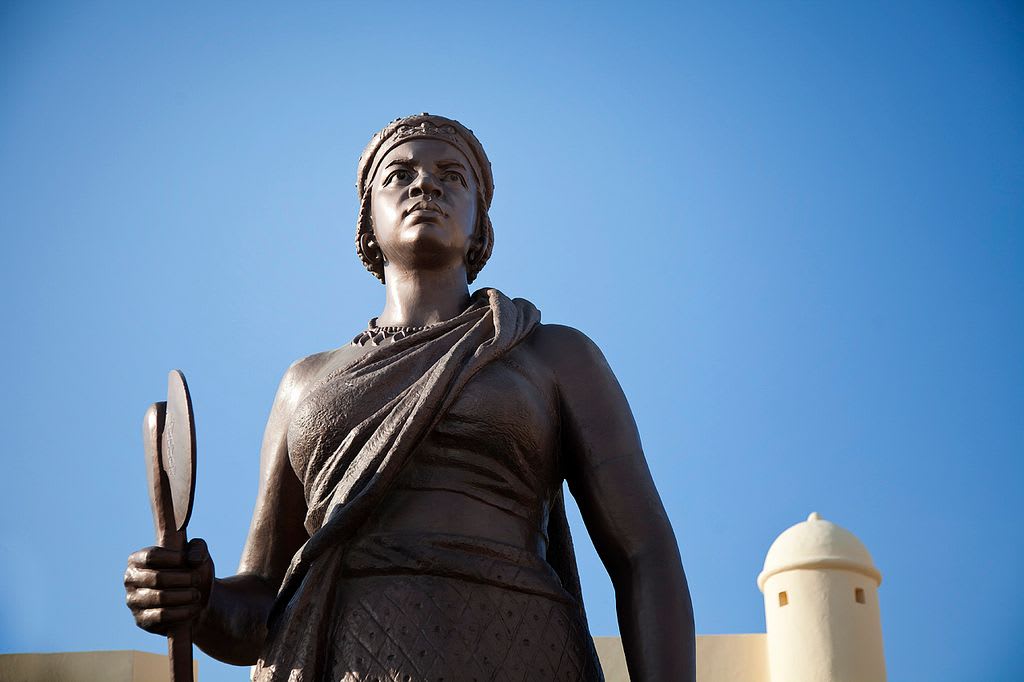The legacy of Queen Nzinga as a ruler of the Ndongo and Matamba Kingdoms in modern-day Angola is celebrated by many central Africans. She was a deft negotiator and 17th-century military strategist who battled valiantly for her Kingdoms’ independence from Portuguese colonization and slave merchants.
The military resistance of the twentieth century that led to the independence of Angola in 1975 may be traced back to Queen Nzinga's anti-colonial struggle. However, Queen Nzinga's legacy is divisive in some circles; she is frequently regarded as a ruthless politician and a vicious slave trader.
Queen Nzinga Mbande was born in 1581, and her father was the King of Ndongo, which made up half of precolonial Angola. Growing up, she was a warrior who dressed in men's attire and was regarded as the country's best political negotiator.
Ascendancy to Leadership
After the death of the King, Nzinga's brother ascended to the throne and appealed to Nzinga for assistance in preventing the Portuguese from enslaving their people. The Portuguese imprisoned Nzinga's brother and seized control of the kingdom.
Nzinga went to the Portuguese governor's office to demand her brother's safe return and the abolition of slavery in Angola. During the confrontation, the governor refused to give Nzinga a seat. As a result, Nzinga told one of her male employees to get down on the ground and sit on him.
The brother to Queen Nzinga was liberated, but eventually committed suicide after recognizing the situation in the country and his helplessness to restore order. Some historians believe Queen Nzinga's brother died in strange circumstances and she had something to do with it.
Nzinga became Queen of Ndongo in 1624, but had many political opponents who were opposed to the idea of a female leader. She was pursued by the Portuguese, and was compelled to flee the nation, retreating eastward to Matamba.
During her exile, Queen Nzinga conquered the northeastern kingdom of Matamba, which was one of the few localities in the region where women had previously ruled. Matamba was also the main African slave-trading state in the Luanda region.
Once in possession of Matamba, Nzinga attempted to build relationships with the Dutch in order to aid her fight against the Portuguese. Her goal was to completely expel the Portuguese from Angola.
Resisting Colonization
Queen Nzinga is famous for her resistance to Portuguese colonialism in Angola. In 1623, she joined the Jaga, a small band of warriors who had arrived from the southern Kwanza River plateaus to battle the Portuguese.
Nzinga sheltered all fleeing slaves from Portuguese-controlled territories. She also encouraged Portuguese-trained African warriors to join her army by promising them land and incentives. She led her soldiers into the Portuguese army in order to urge the Africans to desert.
By the end of 1624, Nzinga was progressively gaining a military advantage over the Portuguese and in 1625, she incited a series of vassal chiefs to revolt against the Portuguese. After forming alliances with erstwhile enemy kingdoms in 1627, Nzinga led her army against the Portuguese beginning a thirty-year old battle with them.
Queen Nzinga was a brilliant strategist who took advantage of European rivalries by forming an alliance with the Dutch, who had taken Luanda in 1641. In 1647, she defeated a Portuguese army with their assistance.
The Portuguese got back on their feet and resumed the war. Nzinga, who was in her 60s at the time, personally led troops into battle. She organized guerilla raids against the Portuguese that would last long after her death, inspiring the eventually victorious 20th-century armed fight against the Portuguese that ended in Angola's independence in 1975.
Queen Nzinga’s Legacy
Queen Nzinga's record as a military leader, diplomat, and spiritual leader is admired in Angola. She holds a unique place in the country's history because of her opposition to colonial power and is regarded as a key source of African nationalism. Her legacy influenced Angola's quest for independence from the Portuguese in the twentieth century.
Queen Nzinga's role as a female leader has motivated African women to combat inequality and rise to positions of leadership. African women have been at the forefront of resisting social structures that encourage inequality and brutality from the time of Nzinga's leadership to the present.
She died quietly in her eighties on December 17, 1663, despite repeated attempts by the Portuguese and their allies to kidnap or assassinate her.
Leave a Comment
Sign in or become a Africa Rebirth member to join the conversation.
Just enter your email below to get a log in link.


Related News
The Rise and Fall of the Ancient Oyo Empire
Nov 26, 2023
How Ancient Egyptian Knowledge Influenced the Invention of Electricity
Aug 29, 2022
The Inhumane Treatment of African Slaves Before Departure to the Land of No Return
Apr 30, 2022